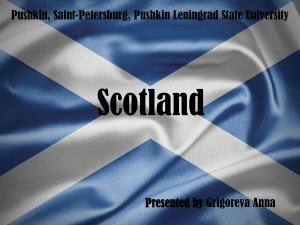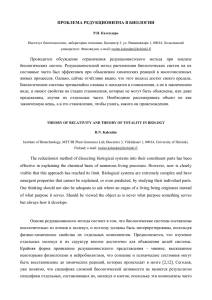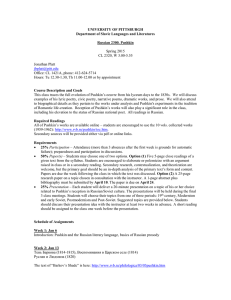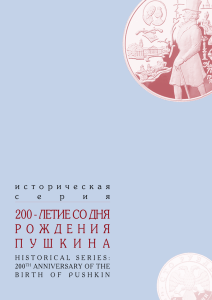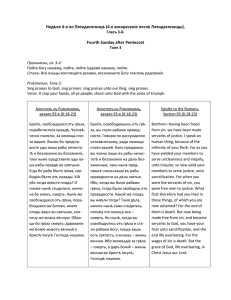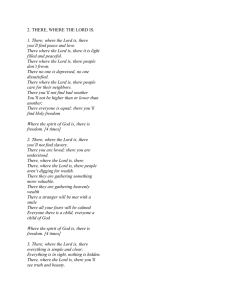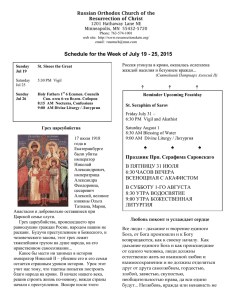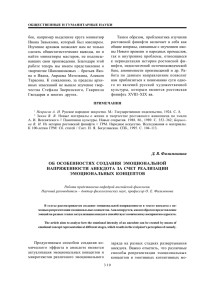Ruslan and Lyudmila
реклама
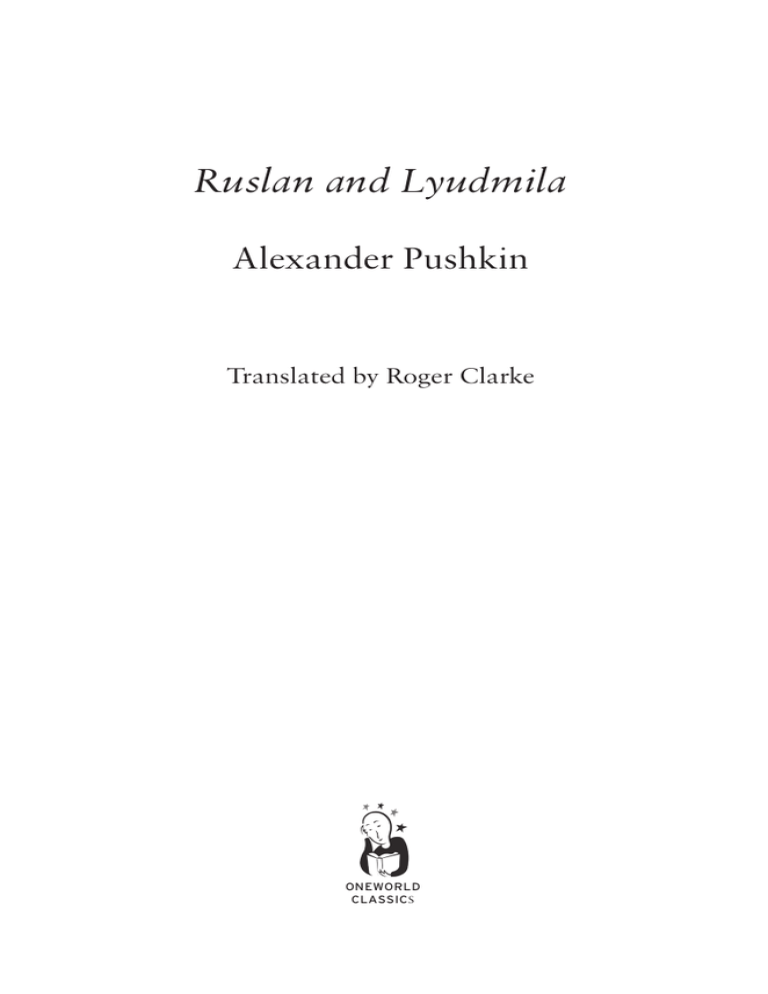
Ruslan and Lyudmila Alexander Pushkin Translated by Roger Clarke ONEWORLD CLASSICS oneworld classics ltd London House 243-253 Lower Mortlake Road Richmond Surrey TW9 2LL United Kingdom www.oneworldclassics.com First published by Hesperus Press Limited in 2005 This revised edition first published by Oneworld Classics Limited in 2009 English translation © Roger Clarke, 2005, 2009 Notes and background material © Roger Clarke, 2009 Front cover image © Getty Images Printed and bound in Great Britain by CPI Antony Rowe isbn: 978-1-84749-130-5 All the pictures in this volume are reprinted with permission or presumed to be in the public domain. Every effort has been made to ascertain and acknowledge their copyright status, but should there have been any unwitting oversight on our part, we would be happy to rectify the error in subsequent printings. All rights reserved. No part of this publication may be reproduced, stored in or introduced into a retrieval system, or transmitted, in any form or by any means (electronic, mechanical, photocopying, recording or otherwise), without the prior written permission of the publisher. This book is sold subject to the condition that it shall not be resold, lent, hired out or otherwise circulated without the express prior consent of the publisher. Contents Introduction Ruslan and Lyudmila Dedication Prologue First Canto Second Canto Third Canto Fourth Canto Fifth Canto Sixth Canto Epilogue ix 1 3 5 9 39 67 93 113 143 165 Note on the Text Notes and Commentary 168 168 Extra Material Pushkin’s Life Ruslan and Lyudmila Note on the Translation Acknowledgements Select Bibliography 185 187 195 202 204 205 Appendix The First Edition of 1820 Notes on Appendix 207 209 220 Alexander Pushkin (1799–1837) Abram Petrovich Hannibal, Pushkin’s grandfather Nadezhda Osipovna Pushkina, Pushkin’s mother Sergei Lvovich Pushkin, Pushkin’s father Natalya Nikolayevna Pushkina, Pushkin’s wife Introduction Alexander Pushkin finished Ruslan and Lyudmila, the second longest of his completed poetical works, in March 1820 when still only twenty years old. Hugely successful with the public and acclaimed as a masterpiece by many of Pushkin’s literary friends, it was denounced by other critics for absurdity, “low” language and some allegedly immoral passages. Pushkin himself was ashamed neither of the poem’s direct and modern diction nor of the gently erotic nature of several episodes; his dedication had already made it clear that he hoped it would be read by his young female contemporaries, who – though furtively, might peep at these mischievous verses and feel a fluttering of love. It is strange, then, that in more recent times Ruslan and Lyudmila has often been dismissed as a children’s book, misprized in Russia, ignored abroad. The fact is that, despite its fantastical plot and light-hearted style, Ruslan and Lyudmila was written for adults – to impress with the variety of its literary pastiche, to astonish with the freshness of its idiom, to delight with the music of its sounds and rhythms, to fascinate with the inventiveness of its narratives, to entertain with the liveliness of its descriptions and to amuse with the ebullience of its irony and humour. Alessandro Gallenzi and I began the task of bringing this master­ piece to the attention of readers of English in the edition published by Hesperus Press in 2005, but now already out of print. For this edition the translation has been extensively revised and the commentary amplified. An appendix has been added to include the material that Pushkin cut from his first edition of 1820 when he republished the work eight years later. The purpose once again is to make Ruslan and Lyudmila available, as the only scholarly edition in English yet ix ruslan and lyudmila produced of this seminal work of Russian letters, as an accurate and readable English translation for those who study or enjoy Russian literature, and as an exciting story well told for those who simply like a good read. An asterisk in the text refers the reader to a note in the Notes and Commentary section, where the notes are listed by page number. – Roger Clarke, 2009 Ruslan and Lyudmila ПОСВЯЩЕНИЕ Для вас, души моей царицы, Красавицы, для вас одних Времен минувших небылицы, В часы досугов золотых, Под шепот старины болтливой, Рукою верной я писал; Примите ж вы мой труд игривый! Ничьих не требуя похвал, Счастлив уж я надеждой сладкой, Что дева с трепетом любви Посмотрит, может быть украдкой, На песни грешные мои. 10 Dedication Queens of my heart, you lovely girls, they’re meant for you and only you, these fairy tales of times gone by. That chatterbox called Long-ago whispered me them, and golden hours I’ve spent transcribing every word. My work of fun, then, please accept. I covet no one’s compliments – just cherish the delicious hope that one of you, though furtively, might peep at these mischievous verses and feel a fluttering of love. 10 У лукоморья дуб зеленый; Златая цепь на дубе том: И днем и ночью кот ученый Всё ходит по цепи кругом; Идет направо – песнь заводит, Налево – сказку говорит. Там чудеса: там леший бродит, Русалка на ветвях сидит; Там на неведомых дорожках Следы невиданных зверей; Избушка там на курьих ножках Стоит без окон, без дверей; Там лес и дол видений полны; Там о заре прихлынут волны На брег песчаный и пустой, И тридцать витязей прекрасных Чредой из вод выходят ясных, И с ними дядька их морской; Там королевич мимоходом Пленяет грозного царя; Там в облаках перед народом Через леса, через моря Колдун несет богатыря; Б темнице там царевна тужит, А бурый волк ей верно служит; Там ступа с Бабою Ягой Идет, бредет сама собой; Там царь Кащей над златом чахнет: Там русский дух… там Русью пахнет! И я там был, и мед я пил; У моря видел дуб зеленый; 10 20 30 Prologue* By an arc of sea a green oak stands; to the oak a chain of gold is tied; and at the chain’s end night and day a learnèd cat walks round and round. Rightwards he goes, and sings a song; leftwards, a fairy tale he tells. There’s magic! It’s a wood sprite’s haunt – a rusalka sits among the boughs – on footpaths no one has explored are tracks of beasts no one has seen – a hut stands there on chicken’s legs, no windows in its walls, nor doors – unnumbered wraiths stalk wood and dale – at dawn the ocean waves roll in and surge across the empty sands, while from the limpid waters strides a troop of thirty champions, fine men, and their sea-tutor too – a king’s son passing by that way takes prisoner an awesome tsar – up in the clouds for all to see above the sweep of woods and waves a wizard hauls a warrior brave – a princess pines in prison there, a brown-haired wolf her loyal page – a mortar in a witch’s form moves to and fro as if alive – frail Tsar Kashchéy wilts by his gold. The place breathes Russia… reeks of Rus! I was there once: I sipped some mead; I saw the green oak by the sea; 10 20 30 ruslan and lyudmila Под ним сидел, и кот ученый Свои мне сказки говорил. Одну я помню: сказку эту Поведаю теперь я свету… prologue I sat beneath it, while the cat, that learnèd cat, told me his tales. One of those tales I still recall, and this I’ll share now with you all… ПЕСНЬ ПЕРВАЯ Дела давно минувших дней, Преданья старины глубокой. В толпе могучих сыновей, С друзьями, в гриднице высокой Владимир-солнце пировал; Меньшую дочь он выдавал За князя храброго Руслана И мед из тяжкого стакана За их здоровье выпивал. Не скоро ели предки наши, Не скоро двигались кругом Ковши, серебряные чаши С кипящим пивом и вином. Они веселье в сердце лили, Шипела пена по краям, Их важно чашники носили И низко кланялись гостям. Слилися речи в шум невнятный; Жужжит гостей веселый круг; Но вдруг раздался глас приятный И звонких гуслей беглый звук; Все смолкли, слушают Баяна: И славит сладостный певец Людмилу-прелесть, и Руслана, И Лелем свитый им венец. Но, страстью пылкой утомленный, Не ест, не пьет Руслан влюбленный; На друга милого глядит, Вздыхает, сердится, горит 10 20 First Canto A tale of the times of old! The deeds of days of other years!* By friends and stalwart sons attended, Grand Prince Vladímir the Resplendent* was feasting in his high-roofed hall. His youngest daughter he was giving as bride to valiant Prince Ruslán; and from a laden jar of mead he drank their health, and drank again. Our forebears weren’t such speedy eaters, nor did the jugs and silver bowls that held the wine and foaming ale pass speedily along the tables. They hissed and frothed around the brim, dousing each inner man with cheer, as stewards gravely bore them round, and humbly bowed to all who drank. Talk mingled in a muffled hum; the guests were buzzing merrily, when all at once a fine voice rang to a clear-toned gusli’s* rippling notes. The hall was hushed to hear Bayán:* the sweet-tongued minstrel hymned Ruslán, and “winsome Lyudmíla”, and “the garland the god of love had plaited for them”. Racked by the fever of his love, Ruslán, though, neither ate nor drank. He gazed and gazed at his dear bride, and groaned and fumed and burned within, 10 20 ruslan and lyudmila И, щипля ус от нетерпенья, Считает каждые мгновенья. В унынье, с пасмурным челом, За шумным, свадебным столом Сидят три витязя младые, Безмолвны, за ковшом пустым. Забыты кубки круговые, И брашна неприятны им; Не слышат вещего Баяна; Потупили смущенный взгляд: То три соперника Руслана; В душе несчастные таят Любви и ненависти яд. Один – Рогдай, воитель смелый, Мечом раздвинувший пределы Богатых киевских полей; Другой – Фарлаф, крикун надменный, В пирах никем не побежденный, Но воин скромный средь мечей; Последний, полный страстной думы, Младой хазарский хан Ратмир: Все трое бледны и угрюмы, И пир веселый им не в пир. Вот кончен он; встают рядами, Смешались шумными толпами, И все глядят на молодых: Невеста очи опустила, Как будто сердцем приуныла, И светел радостный жених. Но тень объемлет всю природу, Уж близко к полночи глухой; Бояре, задремав от меду, С поклоном убрались домой. Жених в восторге, в упоенье: Ласкает он в воображенье Стыдливой девы красоту; Но с тайным, грустным умиленьем 10 30 40 50 60 first canto restively tugging his moustache and counting every waiting moment. At that same noisy wedding board were sitting three young knights – tight-lipped, downcast and sullen. And despite their empty jugs, they took no heed of loving cups that passed the rounds. The victuals did not please them either. To great Bayán they would not listen, but glared disgruntled at the ground. The three were rivals to Ruslán. Frustrated, deep within they nursed the poison of their love and loathing. One was Rogdáy, a fearless fighter, whose swordsmanship had broadened far the lands that wealthy Kiev ruled. Second, Farláf, a loud-mouthed braggart, unchallenged champion at feasting, but poor performer under arms. Last was the Khazar* khan Ratmír, intense as any young man can be. All three of them looked pale and grim – the joyous feast no feast for them. At last it ended. Guests arose and mingled in a noisy throng; all eyes were on the newly-weds: the bride was looking down, as if inner anxieties distressed her; Ruslán, though, radiated joy. Outside now all was swathed in shadow; the sombre midnight hour was nigh; drowsy with mead, the boyar nobles bowed their goodbyes and made off home. Ruslán was overcome with longing: already in his fantasies he fondled shy Lyudmíla’s figure; but the Grand Prince Vladímir, stifling 11 30 40 50 60 ruslan and lyudmila Великий князь благословеньем Дарует юную чету. И вот невесту молодую Ведут на брачную постель; Огни погасли… и ночную Лампаду зажигает Лель. Свершились милые надежды, Любви готовятся дары; Падут ревнивые одежды На цареградские ковры… Вы слышите ль влюбленный шепот, И поцелуев сладкий звук, И прерывающийся ропот Последней робости?… Супруг Восторги чувствует заране; И вот они настали… Вдруг Гром грянул, свет блеснул в тумане, Лампада гаснет, дым бежит, Кругом всё смерклось, всё дрожит, И замерла душа в Руслане… Всё смолкло. В грозной тишине Раздался дважды голос странный, И кто-то в дымной глубине Взвился чернее мглы туманной… И снова терем пуст и тих; Встает испуганный жених, С лица катится пот остылый; Трепеща, хладною рукой Он вопрошает мрак немой… О горе: нет подругой милой! Хватает воздух он пустой; Людмилы нет во тьме густой, Похищена безвестной силой. Ах, если мученик любви Страдает страстью безнадежно, Хоть грустно жить, друзья мои, 12 70 80 90 100 first canto a doting father’s grief, insisted on giving the young pair his blessing. At length the youthful bride was brought to the broad bed she was to share; torches were quenched… the Love god’s image glimmered in his nocturnal flame. Their dreams of fondness had come true, all that love offered now was ready. Garments, resented and resentful, dropped down upon Byzantine rugs… Perhaps you hear the lovers’ whispers, the soft sweet sound their kisses make, the final murmured protestation of shyness, interrupted?… He now feels the surge of pleasure rising; yes, yes, it’s come… Then all at once thunder cracked, lightning gashed the gloom, the image-lamp went out, smoke swirled, the palace, swathed in darkness, shuddered; Ruslán’s whole being was benumbed… A hush!… Then in the awesome stillness there boomed out twice an eerie voice, and someone sheathed in smoke whirled upwards, soot-black amidst the murk and fume… Once more the room was still and empty; Ruslán rose to his feet in shock, cold sweat now trickling down his face. Trembling, with icy hands he probed the darkness, but without response… Horror – the girl he loved had gone! Ruslán clutched at the empty air; the shadows yielded no Lyudmíla, a force unknown had snatched her off. My friends, if one of you’s a martyr to love and suffers hopelessly, he’ll live a wretched life, it’s true; 13 70 80 90 100 ruslan and lyudmila Однако жить еще возможно. Но после долгих, долгих лет Обнять влюбленную подругу, Желаний, слез, тоски предмет, И вдруг минутную супругу Навек утратить… о друзья, Конечно лучше б умер я! Однако жив Руслан несчастный. Но что сказал великий князь? Сраженный вдруг молвой ужасной, На зятя гневом распалясь, Его и двор он созывает: “Где, где Людмила?” – вопрошает С ужасным, пламенным челом. Руслан не слышит. “Дети, други! Я помню прежние заслуги: О, сжальтесь вы над стариком! Скажите, кто из вас согласен Скакать за дочерью моей? Чей подвиг будет не напрасен, Тому – терзайся, плачь, злодей! Не мог сберечь жены своей! – Тому я дам ее в супруги С полцарством прадедов моих. Кто ж вызовется, дети, други?…” “Я!” – молвил горестный жених. “Я! я!” – воскликнули с Рогдаем Фарлаф и радостный Ратмир: “Сейчас коней своих седлаем; Мы рады весь изъездить мир. Отец наш, не продлим разлуки; Не бойся: едем за княжной”. И с благодарностью немой В слезах к ним простирает руки Старик, измученный тоской. Все четверо выходят вместе; Руслан уныньем как убит; 14 110 120 130 first canto he will live, though, you may be sure. But what if after long, long years you’ve now at last embraced your sweetheart – the one you’ve yearned for, pined for, wept for – then, at the moment of your union, you lose her for ever – oh, my friends, myself, I’d sooner die than that! Ruslán, though, still lived on, poor chap. What of the Grand Prince – what did he say? Aghast at the first dreadful news, blazing with anger at Ruslán, he summoned him and all the court. With face aflush and fearsome frown he demanded, “Where’s Lyudmíla? Where?!” (Ruslán stood blankly.) “Youngsters, friends, you’ve always served me well, I know – have pity on me now I’m old! Which of you, tell me, is prepared to gallop off to find my daughter? The one whose mission is successful – to him (you’ll suffer, wretch, you’ll weep for this – couldn’t protect your bride, huh!) to that man I’ll give her as wife with half of my ancestral kingdom. Friends, youngsters, who’ll accept my challenge?” “I will,” the harassed bridegroom muttered. “I… I will,” cried exultantly Rogdáy, Farláf, and khan Ratmír. “Let’s saddle up our horses now; we’ll gladly scour the world for her. So, sire, let’s not prolong our parting; don’t fear: we’re off to find the princess!” And so in speechless gratitude the old man, tortured by his loss, held out his arms to them, and wept. All four of them strode off together. Ruslán was nearly dead with chagrin; 15 110 120 130 ruslan and lyudmila Мысль о потерянной невесте Его терзает и мертвит. Садятся на коней ретивых; Вдоль берегов Днепра счастливых Летят в клубящейся пыли; Уже скрываются вдали; Уж всадников не видно боле… Но долго всё еще глядит Великий князь в пустое поле И думой им вослед летит. 140 Руслан томился молчаливо, И смысл и память потеряв. Через плечо глядя спесиво И важно подбочась, Фарлаф, Надувшись, ехал за Русланом. Он говорит: “Насилу я На волю вырвался, друзья! Ну, скоро ль встречусь с великаном? Уж то-то крови будет течь, Уж то-то жертв любви ревнивой! Повеселись, мой верный меч, Повеселись, мой конь ретивый!” 150 Хазарский хан, в уме своем Уже Людмилу обнимая, Едва не пляшет над седлом; В нем кровь играет молодая, Огня надежды полон взор: То скачет он во весь опор, То дразнит бегуна лихого, Кружит, подъемлет на дыбы Иль дерзко мчит на холмы снова. Рогдай угрюм, молчит – ни слова… Страшась неведомой судьбы И мучась ревностью напрасной, Всех больше беспокоен он, 16 160 170 first canto the very thought of his lost bride tormented him and mortified him. They leapt astride their sprightly stallions; and off they flew along the Dnieper’s* well-favoured banks in clouds of dust. Soon they were fading into distance; soon they’d completely passed from sight; but the Grand Prince still lingered long and looked out on the empty steppe, chasing the horsemen in his mind. 140 Ruslán bore his vexation mutely; his wits, his memory had left him. Behind him, smirking, rode Farláf, who with a haughty backward glance and with a condescending half-turn said to the others: “I can hardly spare the time off for this adventure! Let’s hope I’ll meet the ogre soon. There’ll be such bloodshed then, my friends, such carnage among jealous lovers! Revel in it, my trusty sword, revel in it, my lively steed!” 150 The Khazar khan was even then fondling Lyudmíla in his mind; he almost danced above the saddle; his young blood pulsed, and in his eye the fire of hope already blazed. Now he would gallop briskly forward, now he would tease the knowing horse making him wheel and then rear up, then off he’d dash uphill again. Rogdáy was sullen, unforthcoming. Unsure and nervous of the future and plagued by senseless jealousy, he was least stable of them all, 17 160 170 ruslan and lyudmila И часто взор его ужасный На князя мрачно устремлен. Соперники одной дорогой Всё вместе едут целый день. Днепра стал темен брег отлогий; С востока льется ночи тень; Туманы над Днепром глубоким; Пора коням их отдохнуть. Вот под горой путем широким Широкий пересекся путь. “Разъедемся, пора! – сказали, – Безвестной вверимся судьбе.” И каждый конь, не чуя стали, По воле путь избрал себе. Что делаешь, Руслан несчастный, Один в пустынной тишине? Людмилу, свадьбы день ужасный, Всё, мнится, видел ты во сне. На брови медный шлем надвинув, Из мощных рук узду покинув, Ты шагом едешь меж полей, И медленно в душе твоей Надежда гибнет, гаснет вера. Но вдруг пред витязем пещера; В пещере свет. Он прямо к ней Идет под дремлющие своды, Ровесники самой природы. Вошел с уныньем: что же зрит? В пещере старец; ясный вид, Спокойный взор, брада седая; Лампада перед ним горит; За древней книгой он сидит, Ее внимательно читая. “Добро пожаловать, мой сын! – Сказал с улыбкой он Руслану. – 18 180 190 200 first canto constantly turning on Ruslán a glare of grim ferocity. The antagonists rode on together by the same highroad all that day. Then from the east spread night’s dense shadows; the Dnieper’s sloping shore grew dim; mists rose from the deep-flowing river: the weary horses needed rest. They saw then that beneath the hill another highroad crossed their own. “Let’s separate – it’s time,” they said. “We’ll trust to fate, hold what it may.” The three each gave their mounts full rein and let them choose which road to take. Alone now at the silent crossroads Ruslán, poor chap, still hesitated. His bride and that dire wedding day seemed to him now the stuff of dreams. He raised his brazen helmet’s visor, his strong hands let the reins go slack, he rode on slowly through the grassland, and, as he rode, within his heart confidence waned and hope expired. Then all at once he saw a cave, and in the cave a light. Dismounting, Ruslán strode over to its mouth, arched low with rock as old as nature. He entered, dreading the unknown. Within he found a hermit, agèd, with placid face, mild eyes, grey beard; in front of him a lamp was burning; he sat behind an ancient book, engrossed in reading. Looking up, he smilingly addressed Ruslán: “Welcome indeed, my son!” he said. 19 180 190 200 ruslan and lyudmila Уж двадцать лет я здесь один Во мраке старой жизни вяну; Но наконец дождался дня, Давно предвиденного мною. Мы вместе сведены судьбою; Садись и выслушай меня. Руслан, лишился ты Людмилы; Твой твердый дух теряет силы; Но зла промчится быстрый миг: На время рок тебя постиг. С надеждой, верою веселой Иди на всё, не унывай; Вперед! мечом и грудью смелой Свой путь на полночь пробивай. Узнай, Руслан: твой оскорбитель Волшебник страшный Черномор, Красавиц давний похититель, Полнощных обладатель гор. Еще ничей в его обитель Не проникал доныне взор; Но ты, злых козней истребитель, В нее ты вступишь, и злодей Погибнет от руки твоей. Тебе сказать не должен боле: Судьба твоих грядущих дней, Мой сын, в твоей отныне воле”. Наш витязь старцу пал к ногам И в радости лобзает руку. Светлеет мир его очам, И сердце позабыло муку. Вновь ожил он; и вдруг опять На вспыхнувшем лице кручина… “Ясна тоски твоей причина; Но грусть не трудно разогнать, – Сказал старик, – тебе ужасна Любовь седого колдуна; Спокойся, знай: она напрасна 20 210 220 230 240 first canto “For twenty dreary years, a lonely and tired old man, I’ve languished here; but now at last I’ve lived to see the day that I foresaw far back. Yes, we were meant to have this meeting; sit down and hear what I’ve to say. Ruslán, I know you’ve lost Lyudmíla, and your resolve is faltering; evil’s brief moment, though, will pass: it’s not for long ill-luck will stalk you. In hope, in cheerful confidence face all that comes; don’t be downcast. Ride on, and use your sword, your courage to fight your way to the far north. “Listen, Ruslán, the one who’s wronged you is the dread wizard Chernomór, long-time abductor of fair women. The Midnight Mountains are his realm; till now no man has ever looked upon that wizard’s sanctuary; but you’re the one to vanquish evil; you’ll find an entry, and the villain will meet his end at your right hand. This is as much as I may tell you: from now on, as each day unfolds, the future’s yours to choose, my son.” Ruslán fell at the hermit’s feet and kissed his hand in gratitude. The world glowed bright for him again, his inner torment quite forgotten. He had revived; but then once more his visage flushed with deep revulsion… “I know the cause of your distress,” the old man said, “but I can quickly dispel your fears. That grizzled wizard’s love for your bride is troubling you; listen, be calm: his love is powerless, 21 210 220 230 240
